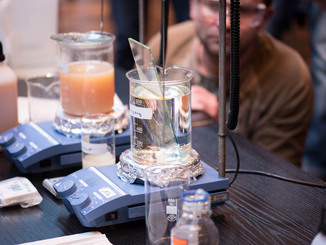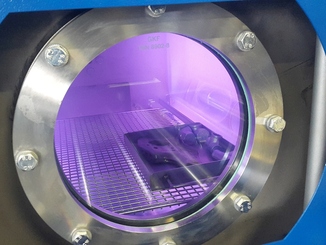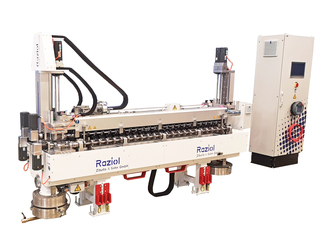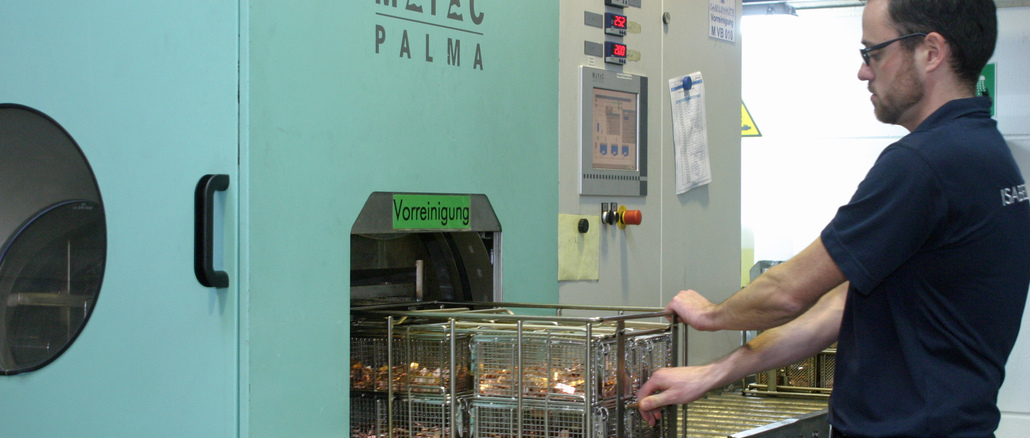
At Isabellenhütte in Dillenburg, six cleaning systems from Mafac are used for a highly complex cleaning process.
“The cleaning machines that we run are not off the shelf. They are individually adapted to our needs,” explains Michael Dickel, process developer at Isabellenhütte in Dillenburg. It is a regular fleet of Mafac cleaning systems, which is set up in a separate hall.
With three Palma, two Malta and one Java, six machines from the Alpirsbach-based expert for aqueous cleaning systems are in use. They are in operation around the clock to complete a highly complex cleaning process. This consists of a pre-cleaning and a final cleaning with intermediate stabilization.
The components must leave the cleaning area in an absolutely clean, dry condition and provided with a tarnish protection, because the cleaning process is followed by soldering as one of the most important work steps.
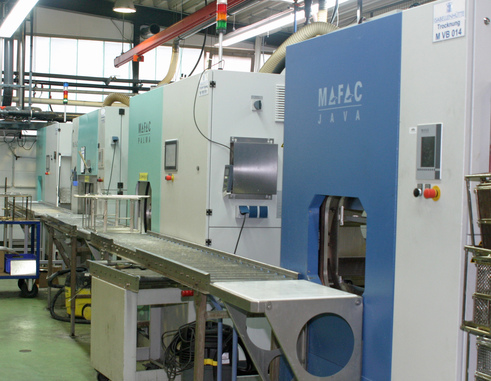
© Mafac
The Isabellenhütte – fully in line with the trend
Even if they look inconspicuous, they are highly sensitive workpieces that are manufactured at Isabellenhütte in Dillenburg. The company, which has been owned by the Heusler family since 1827, is now run as a family business by the eighth generation. It is one of the world’s leading manufacturers of electrical resistance materials, thermoelectric materials for temperature measurement and passive components. These products are manufactured for well-known customers from the automotive, electrical and electronics industries. The main production site is the headquarters in Dillenburg, where 850 employees work.
In the measurement of current, voltage and temperature in cars and trucks, in hybrid and electric vehicles, but also in industrial and regenerative energy generation systems, Isabellenhütte sets standards in the field of precision measurement technology. Since the electrification of vehicles has increased by leaps and bounds in recent years, especially in small cars, this segment is booming. “We were there at the right time with our sophisticated technology,” says marketing manager Rolf Viehmann. This is one of the success factors of the internationally recognized specialist.
Another decisive criterion is the continuous development of new types of products, technologies and manufacturing processes. Added to this is a very high level of vertical integration. This ranges from the production of the alloy to the forming, etching and assembly technology to the complex automatic testing and packaging machine in the final inspection.
Close cooperation with Mafac
The close cooperation between Isabellenhütte and Mafac began almost 20 years ago. After first contacts are made at the Metav, two cleaning machines of the Malta series are purchased in 2002 and 2003. The two three-bath systems still run around the clock, one in the pre-cleaning area and one in the final cleaning area.
In 2011, the “washing line” connected to a manual roller conveyor will be extended by a Palma equipped with three baths. It is currently used in pre-cleaning. This will be followed in 2015 by the installation of another Palma for final cleaning and a Java, which is currently only used for drying in final cleaning.
In early 2017, another Palma was commissioned in the final cleaning. This new Palma has a “loss sink” with direct discharge into the operator’s waste water network and is equipped with an ion exchanger in the rinsing bath, which is controlled by specially developed software. The limit values for the rinsing water are entered there. If these are exceeded, the ion exchanger switches on automatically. “This is already a high quality increase in water treatment within the plant,” says Michael Dickel.
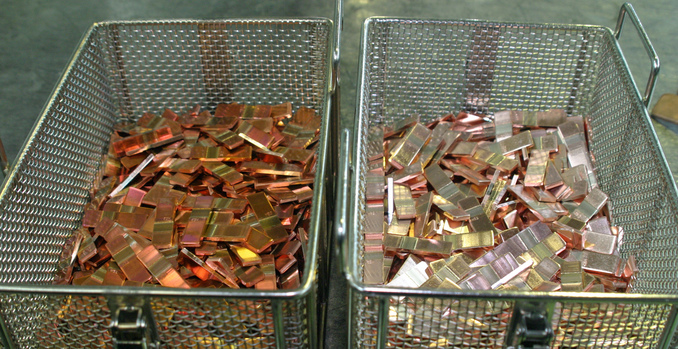
© Mafac
Pre-cleaning – the start of a complex cleaning process
The workpieces that come into the cleaning area at Isabellenhütte are made of nickel and copper alloys. The contaminants that are washed off in the pre-cleaning process are oils and chips. Both the Malta and the Palma are equipped with three bathrooms. The actual cleaning process takes place via bath 1 with ultrasound, to which an alkaline cleaner is added in a three-percent concentration. Subsequently, various rinsing processes are carried out with deionised water from the cleaning plant as well as from an external deionised water rinsing tank.
Cleaning is followed by drying by means of impulse hot air and flow drying. First, the workpieces are blown off in pulses with high-purity compressed air via a rotating blowing system. They are then exposed to ultra-fine filtered hot air.
The Palma is additionally equipped with a vacuum drying system. Drying comprises the longest period of pre-cleaning. “After that, the components have to be dust-dry, as they are temporarily stored in oven racks,” explains Michael Dickel.
Final cleaning – the most difficult part of the cleaning process
The most difficult part of the entire cleaning process is the final cleaning. Here the tarnish protection is applied. This is the most important step. Only if the copper does not oxidize can the subsequent soldering process function optimally.
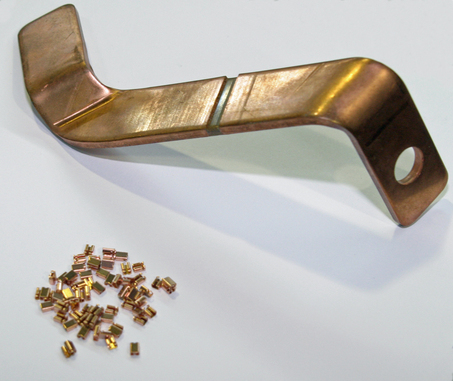
© Mafac
The most important step – the application of the anti-tarnish protection.
“And then comes the most important step,” says the process developer. The tarnish protection is applied using the spray-flooding process technology developed by Mafac. The spray frame equipped with the spray nozzles rotates while the cleaning chamber is flooded at the same time.
Only this special Mafac process guarantees that the tarnish protection reaches every corner, assures Michael Dickel. This is followed by another rinsing process with pure demineralised water (VE = fully demineralised), which is again supplied from the outside. The final drying of the larger parts is carried out in the Palma or in the Malta. The smaller parts are dried in the Java.
Between four and four and a half million workpieces pass through the cleaning process every week. Both the pre-cleaning and the final cleaning take between 20 and 35 minutes. This depends on the size and geometry of the workpieces. The small components are filled as bulk material into small baskets with a mesh size of one to eight millimetres. Several small baskets are fed in a base carrier to the feeding system of the cleaning machine for the cleaning process.
During the cleaning of small workpieces, the movement of the feeding system is set to luffing, with rotating spraying as well as drying system. Only for the larger components can another process technology developed by the Mafac experts be used: the rotation of the feeding system with counter-rotating spraying as well as drying system.
All six Mafac cleaning machines are fed by employees specially trained for this task. They also carry out the final soldering tests. Mafac is responsible for the maintenance of the cleaning systems. Twice a year the technicians from Alpirsbach come to Dillenburg for this purpose. “The service from Mafac is excellent. We feel very well looked after,” confirms Michael Dickel.
About Mafac
MAFAC is one of the leading manufacturers in aqueous parts cleaning. The company offers a wide range of compact machines that can meet a variety of cleaning requirements, depending on the customer’s needs, for example in the automotive and aerospace industries, mechanical engineering, metal-cutting production, hydraulic technology and the electrical industry. All machines are developed and produced at the Alpirsbach site in the Black Forest by over 80 employees. Mafac was founded in 1968, has been involved in industrial component cleaning since 1974 and specialised in this field in 1990. According to Mafac, the patented cleaning process of counter-rotation or co-rotation of the spray nozzle and basket pick-up system sets standards in terms of cleanliness and efficiency. The company is currently active in over 20 countries, including Asia, South America and the USA, with a worldwide network of technical sales agencies and its own subsidiary in France.
Web:
www.mafac.de


